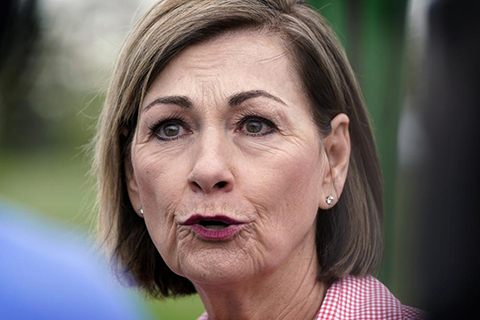By DAVID PITT
DES MOINES, Iowa (AP) — Iowa Gov. Kim Reynolds said Tuesday she will move to end most abortions in the state by turning to the courts and asking them to relax the legal standard used to evaluate restrictions and to reverse a decision that halted a ban as early as six weeks into a pregnancy.
That law bans abortions once cardiac activity can be detected, as early as six weeks and before many women know they are pregnant.
A state court judge found the 2018 law unconstitutional under previous Iowa Supreme Court rulings. However, the high court on June 17 reversed previous precedent, which would allow the law to be considered under a lower legal threshold. The court also suggested it might relax the legal standard even further.
Reynolds said she would pursue that change in the legal standard as well as seeking a reversal of the 2019 decision on the six-week ban.
A week after the Iowa court decision overturning its previous precedent that assured abortion was a fundamental right under the state constitution, the U.S. Supreme Court overturned the 1973 Roe v. Wade ruling that guaranteed the right to an abortion under the U.S. Constitution.
Previously the U.S. Supreme Court guidance was that restrictions could not place an undue burden on women seeking abortions, but the recent decision rejected that. The ruling said a rational basis is the best test for abortion. Laws must be sustained if there is a rational basis on which a legislature could have thought it would serve a legitimate state interest.
Iowa’s ban on abortions after 20 weeks remains in effect while Reynolds pursues more restrictions.
“Now is the time for us to stand up and continue the fight to protect the unborn,” Reynolds said. “The Supreme Court’s historic decision reaffirms that states have the right to protect the innocent and defenseless unborn — and now it’s time for our state to do just that. As governor, I will do whatever it takes to defend the most important freedom there is: the right to life.”
Iowa Attorney General Tom Miller, a Democrat, said he won’t represent the state in the abortion requests for ethical reasons. He said he supported Roe v. Wade and the rationale that underlies it and that he supports the undue burden standard previously established by the federal courts.
He said he can’t “zealously assert the state’s position because of my core belief that the statute, if upheld, would undermine rights and protections for women.” He said in his 40 years in office it’s only the second time he’s chosen not to represent the state.
Alliance Defending Freedom and Iowa attorney Alan Ostergren have agreed to represent the state at no cost to Iowa taxpayers, Reynolds said.
The announcement suggests Reynolds and legislative leaders have decided go to court is a faster way to enact abortion limits than calling a special session to enact a new law. It also could be a political calculation for Reynolds and some GOP legislative leaders seeking reelection in suburban areas where abortion bans aren’t popular. This approach places the burden on the courts to resolve the issue.
“Iowa House Republicans’ goal is to protect the lives of the unborn. That’s why I support the governor’s decision on these legal actions as the best path forward to protect innocent life,” House Speaker Pat Grassley said.
Senate Democratic leader Zach Wahls said Republicans won’t stop until they have completely banned abortion without exception.
“This is an incredibly dangerous action that threatens the health, safety, and future of Iowa women,” he said.
The six-week ban does provide some exceptions, including for rape, incest and when the mother’s life is in danger.
A spokeswoman for Planned Parenthood, which provides most abortions in the state, said Iowans deserve the right to control their bodies and futures.
“Iowa is headed down a dangerous path where Gov. Reynolds will have more say over our reproductive health than we do,” said Sheena Dooley, spokeswoman for Planned Parenthood Advocates of Iowa.




